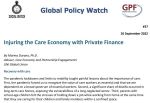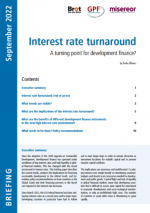Published on Tue, 2022-11-01 11:22
In September 2022, heads of state and government spoke at the UN Headquarters on the theme “A watershed moment: transformative solutions to interlocking challenges”. Secretary-General António Guterres’s message was clear: “Our world is in peril and paralyzed". He launched the High-level General Debate bluntly: “Our world is in big trouble. Divides are growing deeper. Inequalities are growing wider. Challenges are spreading farther.” He urged, “We need action across the board.” |
Published on Thu, 2022-09-29 00:00
The video of the session The event End Austerity Now! is now available. 85% of the world’s population is expected to be under some sort of austerity measures in 2023, according to analysis of IMF projections. But austerity cuts are not inevitable and alternatives exist. In this event, some of the world’s leading experts provided short, powerful and inspiring statements on why we need to end austerity now. |
Published on Mon, 2022-09-26 15:38
Recovery with care The pandemic lockdowns and limits to mobility taught painful lessons about the importance of care. First, the pandemic forced us to recognize the value of care workers as essential and that we are dependent on a broad spectrum of essential workers. Second, a significant share of deaths occurred in long-term care homes, exposing the vulnerabilities of a long-neglected sector. Third, parents with school-age children felt the stresses of holding down a job while working from home at the same time that they are caring for their children and family members within a confined space. |
Published on Fri, 2022-09-16 17:55
Crucial to the achievement of the Sustainable Development Goals (SDGs) of the 2030 Agenda is SDG 17, “Strengthen the means of implementation and revitalize the Global Partnership for Sustainable Development”. Increasingly, discussions now take the form of multistakeholder partnerships and engagement with the business sector as a tool to mobilize finance for the SDGs or generate needed capacity - often to develop a pipeline of bankable projects. This partnership orientation has become a regular feature of the UN agenda, from the Economic and Social Council (ECOSOC) Operational Activities Segment in May 2022 to the High-Level Political Forum (HLPF) in July 2022. |
Published on Thu, 2022-09-15 19:54
Since the adoption of the 2030 Agenda on Sustainable Development, development finance has operated under conditions of low interest rates and high liquidity in global financial markets. This has changed with the recent turnaround in interest rates. The briefing paper Interest rate turnaround. A turning point for development finance? by Bodo Ellmers, describes the current trends, analyzes the implications for financing sustainable development in the Global South, and formulates policy recommendations on how countries in the Global South and their financing partners in the North can respond to the interest rate increases. |







